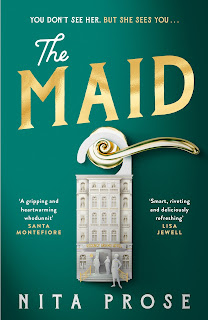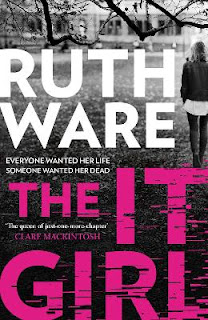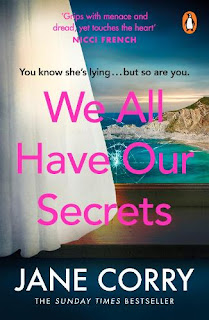Meet Nita Prowse Author Of The Maid
Murder mystery meets uplit in this fortnight's thriller, Nita Prowse's accomplished debut The Maid. You don't know anything about the person who cleans your hotel room, but what secrets of yours does she know?
Prowse tells us how the character of Molly popped into her head, the challenges of mixing two genres and what it feels like to have Florence Pugh starring as the heroine in a forthcoming film version!
Download the ebook of The Maid from Amazon or buy the paperback from Thriller Women's list at Bookshop.org. NB: if you buy books through this link we may earn a commission from bookshop.org, whose fees support independent bookshops.
TW: Congratulations on the publication of The Maid. How did you come up with the plot and the character of Molly?
NP: I was on a business trip to the UK in 2019 when I entered my hotel room and startled the maid who was cleaning it. She gasped and jumped into a shadowy corner, my jogging pants half-folded in her hands. It occurred to me then what an intimate and invisible job it is to be a room maid. By cleaning my room every day, she knew so much about me. But what did I know about her? On the plane home a few days later, my protagonist Molly’s voice came to me. I grabbed a pen and a napkin, and wrote the prologue in a single burst. I didn't know it at the time, but I'd just begun my debut novel.
TW: What is it that attracts you to classic murder mysteries?
NP: Reader participation! The beautiful thing about the genre is that readers are immediately cast as the lead detective. It’s the reader’s job to figure out “whodunnit,” and if they can do so before the end of the book, a particular satisfaction is gleaned. Of course, there’s also another kind of satisfaction that comes from not being able to guess—from being surprised by and satisfied with the author’s ingenuity. Agatha Christie was a pro at this. I bow down to her.
TW: Which authors have inspired you the most?
NP: The list is so very long, but I do love authors who are able to move my heart and engage my mind at the same time. I love Lisa Jewell for her spellbinding domestic suspense, Fredrik Backman for his wild pairings of characters, Gail Honeyman for creating a lovable prickly cactus of a protagonist in Eleanor Oliphant, and Ashley Audrain for her deep questioning of the meaning of motherhood in The Push.
TW: The Maid is your first book. What have you learned from your day job at Simon & Schuster in Canada that helped you write your novel?
NP: I’ve learned everything about the craft of writing from my work as an editor and ghostwriter. It took me five months to write the first draft of The Maid, but it took me nearly two decades to learn the craft that allowed me to write it so quickly. I credit the many authors I’ve worked with and the story-obsessed people in the publishing industry with teaching me everything I needed to know to write The Maid.
TW: It's fascinating that the reader can often interpret situations in ways that Molly isn't able to, leading to tenterhooks! How did you plan having Molly as a character on the autistic spectrum?
NP: Molly is never labelled as such in the book. This was a deliberate decision. I didn’t want readers to approach the novel thinking of Molly as different and “other.” This is a novel about what it means to be the same as everyone else … and yet entirely different. I never flagged the “different” part because I was concerned readers would miss the most important part—how Molly is like all of us. My goal in creating Molly—a character with a unique world view and boundless empathy for others, despite any difficulties she has with social cues—was to invite readers to step into Molly’s skin, to live as her without any preconceptions. I hope that to live as her is love her.
TW: You also weave together two genres, uplit and murder mystery. What were the challenges and pleasures in doing this?
NP: The murder mystery genre comes with an inherent gift for any writer—a built-in engine. The genre is propelled by suspense around a singular question every time: Whodunnit? The challenging part of the genre is finding a way to tread new ground rather than repeating the same narrative pathways other authors have traversed.
I love genre-bending books, stories that seem on the surface to be one thing but change directions or do something entirely unexpected. Early on when I was writing The Maid, I asked myself if it was possible to create a murder mystery that was character-driven and that led with the heart. I combined some of the qualities of the whodunnit with the emotional landscape of uplit—stories that affirm the human spirit and leave you feeling better about the world once you finish them.
If I’ve done things right, the satisfaction derived upon finishing The Maid is not only about getting to the bottom of who murdered Mr. Black but about a sense of hope that lingers once the last page is turned.
TW: Florence Pugh is cast as Molly in a forthcoming film adaptation of The Maid. Any news about when the film will be released and who else will star in it?
NP: I’m so excited that Florence Pugh has signed on to play Molly and that Universal Pictures has optioned the film. At the moment, all I can say is that I can’t say anything. But just know I’m smiling like a Cheshire cat as I write this.
TW: If you didn't work in publishing what would be your dream job?
NP: The only thing I’ve ever been any good at is telling stories and helping other people tell stories. I would love to say that I dream of being an astronaut or a lion tamer or a real estate tycoon, but that would be a bold fabrication. If I one day make it into a writer’s room to observe the craft of writing for TV and film, I’ll consider that pretty dreamy. Until then, you’ll find me squirrelled away at my writing desk doing what I love to do.
TW: Any inside information on what your second novel be about?
NP: In the creative antechamber of my mind, there are many voices and characters clamouring to be heard. I’m working away on a few possible novel ideas, but true to theme, I’ll leave the details a bit of a mystery for now.
Quick fire questions:
TW: Cosy crime or serial killer mystery?
NP: Cosy! I don’t like violence, and I’m not so good with blood.
TW: TV or film?
NP; TV. We are in a renaissance of great TV series. Why do I love them so much? Because the format replicates the structure of a good novel. Each episode is like a chapter in a book.
TW: Favourite way to wind down after a long writing day?
NP: With a Mai Tai on crushed ice, dressed in silk pyjamas, lounging on my green velvet settee. No, not really. The truth is far less glamorous: me in ill-fitting sweats eating take-out straight from the box.
TW: Favourite book?
NP: Just one? Are you people savages? A Prayer for Owen Meany, Eleanor Oliphant Is Completely Fine, The Life of Pi, Room, The Push, Of Mice and Men…. I will stop now. But not because I want to.
TW: Favourite place to write?
NP: In my office at 5 a.m. This is the magic hour when ideas run wild, tempting early risers to catch them and commit them to the page. I feel free from my conscious mind and from pressing distractions. I can hear and see story more clearly when the rest of the world is still dreaming.
NP: Molly is never labelled as such in the book. This was a deliberate decision. I didn’t want readers to approach the novel thinking of Molly as different and “other.” This is a novel about what it means to be the same as everyone else … and yet entirely different. I never flagged the “different” part because I was concerned readers would miss the most important part—how Molly is like all of us. My goal in creating Molly—a character with a unique world view and boundless empathy for others, despite any difficulties she has with social cues—was to invite readers to step into Molly’s skin, to live as her without any preconceptions. I hope that to live as her is love her.
TW: You also weave together two genres, uplit and murder mystery. What were the challenges and pleasures in doing this?
NP: The murder mystery genre comes with an inherent gift for any writer—a built-in engine. The genre is propelled by suspense around a singular question every time: Whodunnit? The challenging part of the genre is finding a way to tread new ground rather than repeating the same narrative pathways other authors have traversed.
I love genre-bending books, stories that seem on the surface to be one thing but change directions or do something entirely unexpected. Early on when I was writing The Maid, I asked myself if it was possible to create a murder mystery that was character-driven and that led with the heart. I combined some of the qualities of the whodunnit with the emotional landscape of uplit—stories that affirm the human spirit and leave you feeling better about the world once you finish them.
If I’ve done things right, the satisfaction derived upon finishing The Maid is not only about getting to the bottom of who murdered Mr. Black but about a sense of hope that lingers once the last page is turned.
TW: Florence Pugh is cast as Molly in a forthcoming film adaptation of The Maid. Any news about when the film will be released and who else will star in it?
NP: I’m so excited that Florence Pugh has signed on to play Molly and that Universal Pictures has optioned the film. At the moment, all I can say is that I can’t say anything. But just know I’m smiling like a Cheshire cat as I write this.
TW: If you didn't work in publishing what would be your dream job?
NP: The only thing I’ve ever been any good at is telling stories and helping other people tell stories. I would love to say that I dream of being an astronaut or a lion tamer or a real estate tycoon, but that would be a bold fabrication. If I one day make it into a writer’s room to observe the craft of writing for TV and film, I’ll consider that pretty dreamy. Until then, you’ll find me squirrelled away at my writing desk doing what I love to do.
TW: Any inside information on what your second novel be about?
NP: In the creative antechamber of my mind, there are many voices and characters clamouring to be heard. I’m working away on a few possible novel ideas, but true to theme, I’ll leave the details a bit of a mystery for now.
Quick fire questions:
TW: Cosy crime or serial killer mystery?
NP: Cosy! I don’t like violence, and I’m not so good with blood.
TW: TV or film?
NP; TV. We are in a renaissance of great TV series. Why do I love them so much? Because the format replicates the structure of a good novel. Each episode is like a chapter in a book.
TW: Favourite way to wind down after a long writing day?
NP: With a Mai Tai on crushed ice, dressed in silk pyjamas, lounging on my green velvet settee. No, not really. The truth is far less glamorous: me in ill-fitting sweats eating take-out straight from the box.
TW: Favourite book?
NP: Just one? Are you people savages? A Prayer for Owen Meany, Eleanor Oliphant Is Completely Fine, The Life of Pi, Room, The Push, Of Mice and Men…. I will stop now. But not because I want to.
TW: Favourite place to write?
NP: In my office at 5 a.m. This is the magic hour when ideas run wild, tempting early risers to catch them and commit them to the page. I feel free from my conscious mind and from pressing distractions. I can hear and see story more clearly when the rest of the world is still dreaming.
Thanks Nita!
Exclusive extract from The Maid:
Prologue
I am your maid. I’m the one who cleans your hotel room, who enters like a phantom when you’re out gallivanting for the day, no care at all about what you’ve left behind, the mess, or what I might see when you’re gone.
I’m the one who empties your trash, tossing out the receipts you don’t want anyone to discover. I’m the one who changes your sheets, who can tell if you slept in them and if you were alone last night or not. I’m the one who straightens your shoes by the door, who puff s up your pillows and finds stray hairs on them. Yours? Not likely. I’m the one who cleans up after you drink too much and soil the toilet seat, or worse. When I’m done with my work, I leave your room pristine. Your bed is made perfectly, with four plump pillows, as though no one had ever lain there. The dust and grime you left behind has been vacuumed into oblivion. Your polished mirror reflects your face of innocence back at you. It’s as though you were never here. It’s as though all of your fi lth, all of your lies and deceits, have been erased.
I am your maid. I know so much about you. But when itcomes down to it: what is it that you know about me?
More about The Maid:
I am your maid. I know so much about you. But what do you know about me?
Molly the Maid is all alone in the world. A nobody. She's used to being invisible in her job at the Regency Grand Hotel, plumping pillows and wiping away the grime, dust and secrets of the guests who pass through. She's just a maid - why should anyone take notice?
But Molly is thrown into the spotlight when she discovers an infamous guest, Mr Black, very dead in his bed. This isn't a mess that can be easily cleaned up. And so Molly becomes embroiled in a hunt for the truth, learning who to trust as she navigates the secret underbelly of the Regency Grand Hotel.
I am your maid. I know so much about you. But what do you know about me?
Molly the Maid is all alone in the world. A nobody. She's used to being invisible in her job at the Regency Grand Hotel, plumping pillows and wiping away the grime, dust and secrets of the guests who pass through. She's just a maid - why should anyone take notice?
But Molly is thrown into the spotlight when she discovers an infamous guest, Mr Black, very dead in his bed. This isn't a mess that can be easily cleaned up. And so Molly becomes embroiled in a hunt for the truth, learning who to trust as she navigates the secret underbelly of the Regency Grand Hotel.




Comments
Post a Comment